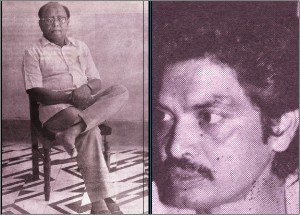Our Talents
Bangladesh's rich cultural heritage has been built up by many notable talents. Some of them have passed away, while some are still contributing to their chosen fields. Here we continue to highlight their laudable moments in alphabetical order. Abdul Jabbar Khan is the director of the first Bangla feature film of the country, Mukh O Mukhosh (1956). It was the first time in this country that any director published an ad, seeking actors and actresses for his film. When the movie was released in 1956, it was a big hit. Mukh O Mukhosh was based on Jabbar's own play Dakat and Jabbar played the lead role. Jabbar directed several other movies like Jowar Elo (1962), Nach-Ghar (1963, in Urdu), Banshori (1968), Kanch Kanta Hirey (1970) and Khelaghar (1973). Born in 1917, Jabbar's career in filmmaking was greatly backed by his involvement with the theatre. Through his relationship with the legendary actor Promothesh Barua, Jabbar had access to the theatre of Kolkata. He was also offered the role of the hero of Barua's film Shapmukti. However, he refrained from acting on personal grounds. After the partition of 1947, he engaged himself in organising and directing theatre groups. In 1949, Kamlapur Dramatic Association staged the play Tipu Sultan under Jabbar's direction. He also wrote several plays for stage like Isha Khan (50), Jago Desh (1959) and Pratigya (1951). Jabbar was a popular leader and organiser. He was the head of the films division of the Mujibnagar Government during the Liberation War in 1971. He also had a long association with the Producers' Society of Bangladesh. Later, he worked as a member of the National Films Award Jury Board, the Films Censor Board and the Film Institute and Archive. He was awarded the FDC Silver Jubilee Trophy in 1983. He passed away on December 29, 1993. Amjad Hossain an actor, director, scriptwriter and lyricist, is one of the major names in our film industry. Born on August 14, 1942, he showed interest in literature at an early age. In the 1950s, he came to Dhaka and from then on was totally involved in the practice of literature and theatre. Amjad first acted in the film Tomar Amar (1961). Later, director Salahuddin made a film on Amjad's play Dharapat in which Amjad played the lead role. At that time he got involved with the Zahir Raihan Unit and worked in different projects. Amjad's career as a director started with the film Agun Niye Khela (1967) where he worked as an assistant. Gradually, he came to direct and act in many award-winning films like Julekha (1967), Balyo Bandhu (1968), Pitaputra (1970), Koshai (1980), Nayanmoni (1976), Golapi Ekhon Trainey (1978), Shundori (1979),Sokhinar Juddha (1984), Bhat Dey (1984), Janmo Theke Jolchhi, Dui Poyshar Alta and Hiramoti (1988). Acclaimed film on our Liberation War Abar Tora Manush Ho was also based on a story by Amjad Hossain. Amjad received the National Film Award several times: for the best movie, best dialogue, best script, best direction and best music direction for the film Golapi Ekhon Trainey in 1978, for music of the film Shundori in 1979 and best director for the movie Bhat Dey in 1984. He was also awarded the BACHSHASH Award for best story for Abar Tora Manush Ho in 1973, best dialogue for Nayon-Moni in 1976, Golapi Ekhon Trainey in 1978 and Bhat Dey in 1984, for best lyric for Janmo Theke Jolchhi in 1981 and best direction for Hiramoti in 1988.
|

Abdul Jabbar Khan and Amjad Hossain |